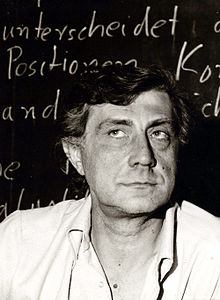Franco Basaglia
| Franco Basaglia | |
|---|---|
 |
|
| Born |
11 March 1924 San Polo, Venice, Italy |
| Died | 29 August 1980 (aged 56) San Polo, Venice, Italy |
| Nationality | Italian |
| Fields | Psychiatry |
| Institutions | University of Padua, University of Parma, mental hospitals in Padua, Gorizia, Parma, Trieste, Arezzo, mental service in Lazio |
| Alma mater | University of Padua |
| Known for | Creating Democratic Psychiatry and Basaglia Law, initiating Italian psychiatric reform |
| Influences | Karl Jaspers, Ludwig Binswanger, Eugène Minkowski, Edmund Husserl, Martin Heidegger, Maurice Merleau-Ponty, Jean-Paul Sartre, Michel Foucault, Erving Goffman |
Franco Basaglia (Italian: [ˈfraŋko baˈzaʎʎa]; 11 March 1924, Venice – 29 August 1980, Venice) was an Italian psychiatrist,neurologist, professor who proposed the dismantling of psychiatric hospitals, pioneer of the modern concept of mental health, Italian psychiatry reformer, charismatic leader in Italian psychiatry, figurehead and founder of Democratic Psychiatry architect, and principal proponent of Law 180 which abolished mental hospitals in Italy. He was the most influential Italian psychiatrist of the 20th century.
Franco Basaglia was born on 11 March 1924 in Venice. After obtaining his medical degree from University of Padova in 1949, he trained in the local school of psychiatry, where he acquainted himself with the philosophical ideas of Karl Jaspers, Ludwig Binswanger and Eugène Minkowski, developed an interest in the study of phenomenological philosophers such as Edmund Husserl, Martin Heidegger, Maurice Merleau-Ponty, and Jean-Paul Sartre, and analyzed the work of sociological and historical critics of psychiatric institutions such as Erving Goffman and Michel Foucault.
According to Renato Piccione, the intellectual legacy of Franco Basaglia can be divided into three periods:
When Basaglia arrived at Gorizia, he was revolted by what he observed as the conventional regime of institutional ‘care’: locked doors only partly successful in muffling the weeping and screams of the patients, many of them lying nude and powerless in their excrement. And Basaglia observed the institutional response to human suffering: physical abuse, strait jackets, ice packs, bed ties, ECT and insulin-coma shock therapies to ‘quiet’ the melancholy and the terrified, and to strike terror in the agitated and the difficult.
...
Wikipedia
